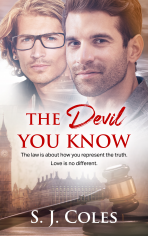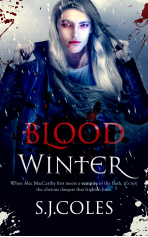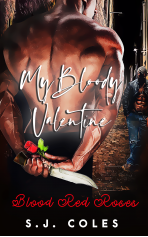Hilary took a deep breath. His shirt, new on that morning, was sticking to the small of his back. He looked up at the Hart-Gosfords’ Mayfair townhouse and told himself, yet again, that it was just another case.
You can do this.
He straightened his back, let out the breath and pushed the intercom.
“Yes?”
“Hilary Whyte from Gunnerson and Gains to see Mr. Hart-Gosford.”
The gate buzzed and swung open. Hilary transferred his briefcase from one hand to the other so he could wipe his palms on his trousers as he climbed the steps to the front door. Before he could knock, it was opened by a short, stiff-necked man with a smart suit and a grim expression. The scar of an old piercing marred one eyebrow and another, more jagged, bisected the fleshiest part of his neck. The marks, combined with the crew-cut, made him more look like private security than house staff, though it didn’t surprise Hilary that the Hart-Gosfords felt the need for both.
“This way.”
Hilary resisted staring at the minimalist paintings and crystal sculptures as he followed the butler into a well-appointed parlor. It was best not to appear daunted by such things, even though just one of these pieces was probably worth more than he made in a year, even now.
Tall windows flooded the room with weak spring sunshine. Two women with the same shade of platinum hair looked up as he entered. The younger, who sat on the edge of a mauve love seat, wore a carefully schooled expression, the sort executed best by those who spent a lifetime practicing it. But Hilary detected strain in her slate-gray eyes. The older woman managed to look down her nose at Hilary, even though she barely grazed five feet in her thin-heeled patents. Her eyes, a shade paler than her daughter’s, were sharper than cut glass.
“Mr. Hilary Whyte, ma’am…for Master Dominic.”
“Thank you, Merriweather,” the younger woman said, her accent crisp. “Some coffee, I think. Coffee, Mr. Whyte?”
“Yes, thank you,” Hilary said, finally spotting the other figure in the room. Dominic Hart-Gosford stood with his back to them as he poured whiskey into a tumbler on a chrome sideboard. Even at this distance, Hilary could see that his hair had darkened since school, now a brown just this side of black. He’d also added yet more muscle to his six-foot-three frame. Hilary fought to keep his face neutral.
“You’re the solicitor Walter recommended?” the older woman said, examining Hilary like he was something she’d just stepped in.
“That’s right.”
“This is simply not acceptable—”
“Mother—”
“No, Amelia,” the older woman cut her off. “This simply will not do. You…Mr. Whyte. How old are you?”
“I’m twenty-nine, Mrs. Hart.”
She lifted an eyebrow. “I was not aware Walter Gunnerson had a sense of humor—or that he would have such poor taste as to use my son-in-law’s murder trial as a chance to exercise it.”
“I can assure you, Mrs. Hart, I am a fully qualified solicitor with years of experience in criminal defense.”
“How can you possibly have years of experience?”
“By dedicating almost every waking hour to my profession since I was eighteen years old,” Hilary replied without inflection. “Mr. Gunnerson supplied you with my trial record, I believe?” Mrs. Hart narrowed her eyes. “If that is not enough to reassure you, you are more than welcome to apply to the senior partners for a change of counsel. But, in the meantime, there is rather a lot to be done. So, if you don’t mind…” Hilary indicated the open door.
“I suggest you don’t get too comfortable,” Mrs. Hart said, then swept from the room.
“I’m sorry for my mother,” Amelia said, standing and clasping her manicured hands together. “This is a trying time.”
“I understand,” Hilary said with a careful smile. “But it will take at least a few hours for your mother to try to have me removed from this case. In the meantime, my time is best served speaking with your husband.”
“Yes, of course.” She glanced back at Dominic. He stood, gazing out of the window, his drink untouched in his hand. Hilary took in the broad shoulders, the trim waist, the controlled stillness in his stance and hurriedly suppressed the memories that threatened to surface before they could show on his face.
Amelia stepped forward, lowering her voice. “My husband is innocent, Mr. Whyte. Whatever you think you know, you must believe that.”
Hilary smiled but did not speak. Amelia left as Merriweather appeared with a silver tray of coffee and china cups and set it down.
“You sure you don’t need me, sir?” he said, his eyes on Hilary.
“I’m fine, Merriweather. Thank you.”
Merriweather withdrew, closing the door behind him, and Hilary fought the impression that the room had shrunk.
Dominic finally turned around. Hilary had told himself many times in the last few weeks that he’d forgotten what this man looked like—that he’d successfully wiped the image from his mind, along with the sound of his voice. But as he took in the eyes, blacker than midnight, the hard, almost cruel set to a jaw that would otherwise be considered handsome, it was like Hilary was again sprawled on the PE changing room floor, that same face hanging over his, bloodied lips twisted and mocking, his fist raised for another blow.
“So, it really is you.” Dominic didn’t speak loudly, but it was like a stone had dropped into the silence of the room. “I could have laid a considerable amount of money on never seeing you again.”
“Well, I guess we would have both lost that wager. Shall we?” Hilary said, indicating the sofas and coffee.
“I’m good,” Dominic said, lifting his glass. “You help yourself.”
Hilary sat, ignoring the coffee, even though his veins were clamoring for caffeine. Fear that the coffee pot would shake in his grip was too real. Instead, he opened his briefcase and began laying the paperwork out on the narrow glass table. “It probably would have been better to meet at the office for this—”
“Too many flapping ears,” Dominic said. “My mother-in-law has some trust issues, to say the least.”
“We can manage here if you’re more comfortable. But just so you know,” he said, pulling a device out of his case and laying it on the coffee table, “I’ll be recording every session.”
“Still have trust issues of your own, I see.”
“So,” Hilary said, switching the recorder on, not meeting Dominic’s eye, “I’m up to speed on all the known facts of this case. This meeting is for me to get to know your side of the story in more detail and to help you prepare for what happens next.”
Dominic gazed at him thoughtfully. “I’ve been trying to remember… What was it we called you? In school?”
“That isn’t—”
“Lilywhite. That was it, wasn’t it?”
Hilary took a moment to steady his voice. “Let’s get one thing straight right from the start, Mr. Hart-Gosford,” he said levelly. “Our personal connection is one of the reasons why Walter Gunnerson wanted me to represent you. But all he knows is that we both attended St. Edmund’s.”
Dominic lifted his fine, black eyebrows. “If the good Mr. Gunnerson knew the truth, he might wonder why you agreed to take this case at all…as I do.”
Hilary looked him in the eye. “I’m capable of not allowing the past to affect my judgment. But if you insist on bringing it up, it will become a problem. Understand?”
He sipped his drink. “I understand.”
“Good. And now that’s on record,” Hilary continued, nodding at the recording device, “perhaps we could discuss your case?”
“There’s nothing I would like more.” Dominic’s smile widened and he unbuttoned his suit jacket and lowered himself onto the sofa, draping one arm along the back and crossing his long legs. “Where do we start?”
Hilary took in the mocking slant to his mouth. “I think we need to start by establishing just how serious this is.”
“I am aware of the seriousness of the situation.”
“I’m not sure you are. You have been charged with double murder. First degree. If you’re convicted, you will go to prison for life.”
“I know you won’t allow that to happen.”
“But you have means, motive and no alibi.”
“I didn’t do it.”
Hilary examined Dominic for a long moment—his strong limbs held so still, his cool expression…
“From the top, then,” Hilary continued, sliding the witness statements over the table. “On the morning of Thursday, the twenty-third of November last year, a postal worker attempting to deliver a package to Number 4 Kensington Gardens found the front door open. He rang the bell, but there was no answer. He pushed the door ajar, thinking to leave the package on the mat. It was then he saw the murdered body of Dean Wood on the stairs and called the police. When the police arrived, they discovered Dean’s twin sister, Lizzie, the resident of the property, in the living room, also dead. Lizzie had been shot seven times. Dean twice. The neighbors never heard a thing, so the police believe a silencer was used.”
Dominic was watching him over the rim of his glass as he sipped his drink.
Hilary looked away. “Lizzie’s neighbors say Dean quite often came over to cook dinner for them both. But there was no set routine for this, so it’s believed Lizzie was the intended target.” Dominic’s gaze dropped to the papers on the table, but he didn’t speak. “Feel free to contribute at any point,” Hilary said after a pause.
“Thank you. I will.”
Hilary repressed his impatience and placed the crime scene photographs on top of the witness statements. A young, brunette woman lay on her back, her head twisted at an awkward angle. Her eyes were wide and staring. Blood soaked her sun-yellow top almost black and stippled the skin of her face and neck. A young man with a similar build and coloring was sprawled on a staircase, the treads and banister smeared with blood where he’d tried to drag himself up.
Dominic looked at them, his own eyes unreadable. “Do I really need to see these?”
“Lizzie Wood worked for you?” Hilary said, tapping the picture of the dead girl.
“I believe so. Or, rather, not me…Amelia. Some sort of low-level admin in one of the charities. I’d never met her.”
“Never?”
“No.”
Hilary laid out another photo. It was of Dominic at a formal occasion, resplendent in an elegant dinner suit and black tie, a glass of champagne in hand and a fixed smile for the camera. He was amongst half a dozen other people in front of a banner emblazoned with the slogan Homes with Hart. Amelia, looking stunning in an azure ball gown and flashing white smile, was on his right. Lizzie Wood, looking shy, despite her professional updo and designer playsuit, stood at his left elbow.
“I explained this to the police,” Dominic said. “I go to dozens of these things. I try not to speak to people unless I have to. I rarely remember them.”
That’ll be the drink. Hilary pushed the thought aside. “Lizzie was fired from Homes with Hart about a month before she died.”
“I believe so.”
“Do you know why?”
“I didn’t then. I do now. She’d been making fraudulent expense claims.”
Hilary laid a bank statement on top of the other papers. “Lizzie Wood was in a considerable amount of debt—credit cards, payday loans. There’s even some evidence that she’d resorted to some less-than-legal solutions more recently.”
Dominic swirled his whiskey and didn’t speak. Hilary pointed at a highlighted transaction on the bank statement. “This cash deposit was paid into her account the week before she died. Ten thousand pounds.”
“The police told me all this. I still don’t know anything about it.”
“You’re sticking to your story that Lizzie Wood wasn’t blackmailing you?”
Dominic put the glass down on the table with a definitive click. “I have answered all these questions several times already, Mr. Whyte.”
“I have read your answers to the police, but now I’d like you to answer me. And, for the sake of the case, please realize that the truth is more important than looking innocent.”
Dominic leveled a hard look at him. “I did not know this woman. She did not blackmail me. How and why that money ended up in her account, I can’t explain. An examination of my own accounts has revealed no large withdrawals. There is nothing to connect me to any of this.”
“Except your DNA at the scene.”
Dominic sighed and crossed his legs the other way. “One hair…just one. No skin cells, no fingerprints—no other more interesting forms of DNA.”
Hilary tried to decide if there was a spark in his eye.
“The hair is pretty damning, Mr. Hart-Gosford,” he continued. “It was found under Dean Wood’s body. How did it get there?”
“I don’t know.”
Hilary turned to the next page of his notes.
“Lizzie and Dean died around eleven p.m. on the night of the twenty-second of November. You were supposed to be at a banquet with your family and their guests at Brentwold Hall that night. There were several high-profile guests, including some prominent politicians and foreign dignitaries, so they had security cameras installed in the banqueting hall.”
“I take it the police finally got a warrant for the footage?”
“They did.”
Dominic stood in one fluid motion and returned to the sideboard. “Sure you don’t want something stronger?”
“I’m fine,” Hilary said, taking the opportunity while Dominic’s back was turned to pour himself some of the now-cooling coffee. A couple of mouthfuls and he found as Dominic returned that he was able to meet his eye without flinching. “Why weren’t you at the banquet, Mr. Hart-Gosford?”
“For fuck’s sake, Hilary,” he said as he resumed his seat. “Call me Dominic.”
“Mr. Hart-Gosford. Please answer the question.”
He sighed. “You still have that stick up your arse, I see. But, either way, my statement to the police is the truth.”
“‘Changed your mind at the last minute’ is not going to cut it with me.”
“It will have to.”
Hilary laid down his pen. “Not a single traffic camera picked up your Bentley leaving London that day. You never even left town.”
“I never said I did.”
“So from the time you were last seen leaving your mother-in-law’s art gallery at just after four p.m., to when your security cameras picked you up returning here at a little after eight the following morning, where were you?”
“Walking.”
“Just walking?”
“That’s right.”
“But you didn’t make a single payment on any of your credit cards and had your phone off the whole time?”
Dominic glanced at his left hand. “You’re married, yes?”
Something sharp went through Hilary’s chest. He glanced at his platinum ring then busied himself with papers. “Engaged.”
Dominic raised his eyebrows. “She makes you wear an engagement ring?”
“How is this relevant?”
“Best decision I ever made, marrying Amelia,” Dominic said after a pause. “We are partners…in everything. Eloise may be an overbearing harridan at times, but I am more a part of their family than I was ever a part of my own.” He drained his glass and looked away. “But belonging to a family like this…? There’s a price. The world watches everything—where you shop, where you eat, who you see.” He met Hilary’s eyes again, something dark glittering in the black depths. “Sometimes I need time to myself.”
“It is very, very unfortunate that you chose that particular night to go dark.”
“I didn’t kill anyone.”
“So tell me where you were.”
“You’re just going to have to trust me.”
“Were you drinking? On drugs?”
“Excuse me?”
“When someone won’t admit the truth to their solicitor, it’s for one of two reasons. They’re guilty or they’re ashamed. Sometimes both.”
“I told you that I just wanted to be alone.”
“I’m not here to judge,” Hilary said levelly. “There is literally nothing you could say that would shock me—”
“I highly doubt that.”
“But anything the prosecution might find out, I need to know first. Only then can I prepare for it coming up in court.”
“So you think the only possible explanations are that I was either murdering these two people or shooting up in a smack den? Good to know my lawyer has so much faith in me.”
“You’re not giving me much to work with.”
A corner of Dominic’s mouth twitched. “I’ve read your trial record. I believe you’re more than capable of winning this without anything so trivial as an alibi.”
Hilary clenched his jaw. “So we’ve covered motive and opportunity. Let’s move on to means. Forensics have determined the murder weapon was a semiautomatic nine-millimeter handgun. Do you own a gun, Mr. Hart-Gosford?”
“You know I don’t.”
“You don’t possess a firearms license,” Hilary returned coolly. “That’s not the same thing.”
Dominic looked away. “No. I do not own a gun.”
“But your wife does,” Hilary said, pulling out a copy of her license and laying it on top of the photographs of the victims. “Three, in fact. Semiautomatic nine-millimeters.”
“That’s correct,” he said with a hard look. “Which must have been known by the killer.”
“Why does she own these weapons?”
“She is a sportswoman…” Dominic indicated the awards and trophies in the glass cabinet by the window. “And, before you ask, she keeps her weapons locked securely at her gun club.”
“Your wife was filmed at the banquet all night, so we know she couldn’t have done this. But now I must ask if you have ever fired these guns yourself?”
“Once or twice…at the range, with Amelia. But I don’t like guns.”
Hilary raised an eyebrow. “Do you have access to them? The truth, please. The police and prosecution will be making inquiries at the club as we speak.”
Dominic smiled. “Not…officially.”
“And…unofficially?”
Dominic gazed into his drink. “If you know the right people to tip, there are always ways around paperwork.”
“So you’ve accessed her guns without her present?”
“No. But she sometimes takes friends to her club. Only members and their list of pre-approved guests are allowed to fire the weapons. But she has intimated that there are ways around it.”
“Why aren’t these friends on her list?”
“You’d have to ask her that.”
Hilary scribbled more notes. “You haven’t mentioned the security cameras at the gun club,” he said. “Is that because you know there are ways around those, too?”
“I assumed that if there was footage of someone accessing my wife’s guns on the night of the murder, we wouldn’t be sitting here right now.”
“It’s true. The security cameras at the club were malfunctioning the night of the murder.”
“Either way, Amelia’s guns are accounted for.”
“Yes. Mrs. Hart-Gosford gave her guns up to ballistics soon after your arrest. Were you made aware of the findings?”
“The police said they had been fired recently. But Amelia went to the club for a few rounds before leaving for Brentwold, so that doesn’t mean anything.”
“And the fact that they had been cleaned?”
“Amelia takes good care of her weapons.”
Hilary drained the coffee and set the cup back on the tray. “I think it’s time we talk about your plea.”
“What’s to talk about?”
Hilary met his eye squarely. “It is my duty to inform you that, from a legal point of view, your best option, at this stage, with this evidence—”
“I’m not pleading guilty.”
“If you just let me explain—”
“I will not say I’m guilty just to make your job easier.”
Hilary was unable to stop the color from heating his face and cursed his pale skin for the millionth time. “It’s not about making my job easier. It’s about getting the best possible outcome for my client—in this case, you.”
“The best possible outcome is me walking away from this sordid mess with my name cleared.”
“I can only do that if the proof exists.”
“So do your job. Find it.”
“Mr. Hart-Gosford,” Hilary said, dredging together his last scraps of patience, “if you plead guilty before this goes to trial, I’m confident we can get the charge down to manslaughter with diminished responsibility—”
“What do you mean by ‘diminished responsibility’, exactly?”
Hilary started to gather the papers, his gaze lowered. “There had been one payment already. Blackmailers rarely stop at one. You were under pressure. You were scared. Possibly…intoxicated.” Dominic clenched his fists. Hilary went on like he hadn’t noticed. “If we can make a case for this being a spontaneous act,” Hilary went on, “committed whilst your capacity was compromised, and you admit to it, there’s a good chance you’ll be looking at ten years, tops. Less with good behavior.”
“If you wanted to get your own back, Hilary, why not just join a Twitter? Write a blog? Sell your story to The Sun? It would be a lot less troublesome than trying to get me to plead guilty to a crime I didn’t commit.”
Hilary straightened and met Dominic’s eye. “As I said, it is my job to present the best legal options available to you. If this goes to trial and we lose, you will go to prison for the rest of your life.”
“So don’t lose.”
Hilary turned off the recorder. “You need to be realistic.”
“I am all too well acquainted with realism,” Dominic said, an edge to his voice.
“The plea hearing is in two days’ time. You need to think about it.”
“I’ve done all the thinking I need to.”
Hilary surveyed him narrowly. “Going to trial means everything coming out. Everything. Your arrests, the news reports, the rumors, the photographs you thought your family had buried. The prosecution will find it. All of it.”
“I’m not afraid of the truth. None of it means I killed anyone.”
“Maybe not. But it will still affect people’s judgment of you. The jury’s judgment. They aren’t supposed to read up on you, but they will. You need to be aware of that—and that is what we need to mitigate.”
“Mitigate?”
“If you want people to believe you’re innocent, start acting innocent.”
Dominic smiled. “Anything you say, Mr. Whyte.”





















 Facebook
Facebook Twitter
Twitter